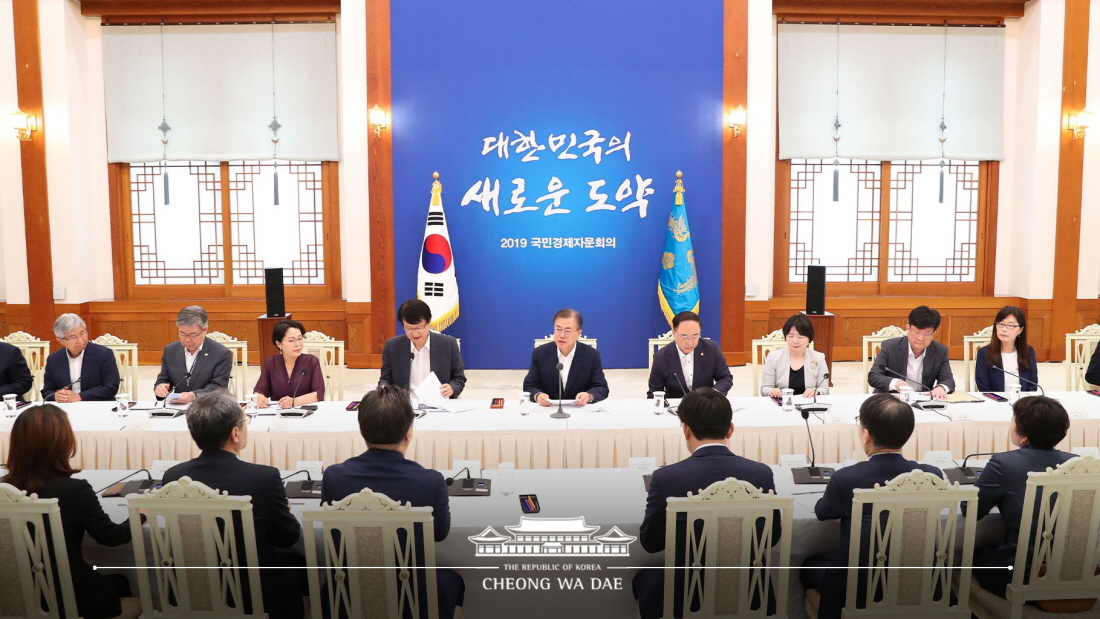이 웹사이트는 제19대 대통령 임기 종료에 따라 대통령기록관이 「대통령기록물 관리에 관한 법률」에 의해 이관받아 서비스하는 대통령기록물입니다. 자료의 열람만 가능하며 수정 · 추가 · 삭제는 불가능합니다.
다만, 「개인정보보호법」에 의하여 개인의 정보를 보호받기 원하시는 분은 관련 내용(요청자, 요청내용, 연락처, 글위치)을 대통령 웹기록물 담당자(044-211-2253)에게 요청해 주시면 신속히 검토하여 조치해 드리겠습니다. 감사합니다.
SPEECHES & REMARKS
BRIEFINGS
Opening Remarks by President Moon Jae-in at Plenary Meeting of National Economic Advisory Council

I am glad to meet you all.
We’ve convened a plenary meeting of the National Economic Advisory Council, the first for this newly appointed Council. Its significance is all the more special at a time when our economy is faced with a grave situation. Esteemed professionals from various sectors, including NEAC Vice Chair Lee Jay-min, have been invited to serve as Council members. I look forward to your invaluable service. We’re in a situation that requires your wisdom more urgently than at any time before.
Trade tensions between major economic powers and the spread of protectionism have brought enormous difficulties to Korea’s highly export-dependent economy. Worse yet, Japan’s unwarranted imposition of export restrictions has added to these hardships. Japan removing Korea from its list of “white countries” on August 2 has aggravated the situation.
Just how far Japan will carry this situation remains to be seen. However, just the measures that have been taken so far are already proving detrimental to both countries’ economy and people. They are undermining the free trade order and confidence in the international division of labor, and the entire world is voicing concerns over them as well. Japan is one of the countries that have benefited most from the free trade order, and it has actively championed the principle of free trade whenever needed for its own interest. Thus, Japan’s recent move is very self-contradictory.
I can’t figure out what advantage Japan will gain from its unilateral trade restrictions. Even if there are some benefits expected, they will be nothing but fleeting. After all, there are no winners in this game that will make everyone victims, including Japan itself.
Now is the era of a highly sophisticated worldwide division of labor. Each nation has certain strengths and weaknesses. If one country weaponizes a sector where it has a comparative advantage, the peaceful international order of free trade will be compromised. Japan will end up losing the international community’s confidence. Japanese companies will also suffer by losing a market. Japan must revoke its unjustifiable export restrictions at the earliest date possible.
Japan initially cited the Korean Supreme Court’s rulings on forced labor during World War II as the reason, but it has changed the wording to its advantage at every opportunity, later saying its decision came down to the mismanagement of export controls on strategic materials. Consequently, we’ve come to doubt what its real intention is.
Contrary to Japan’s argument, international assessment agencies have stated that Korea implements export control for strategic materials far more strictly and properly than Japan. The U.S.-based Institute for Science and International Security evaluated and ranked 200 countries around the world this year on their export controls for strategic materials. Korea came in at 17th – far higher than Japan’s 36th place ranking.
No matter how it changes its excuses, Japan’s actions constitute economic retaliation against our Supreme Court’s rulings on wartime forced labor. This is the same as tying a ruling by the judiciary of another sovereign nation to an economic issue and is tantamount to a breach of the separation of powers, the broad principle of democracy.
We have to reflect soberly on our economy following this incident and turn it into an opportunity for a new growth surge by improving our economic fundamentals and industrial ecosystem.
Beginning with short-term measures to minimize damage to local businesses immediately, this is a time to localize parts and materials and improve the competitiveness of related industries. Furthermore, this is also a time to devise more comprehensive and fundamental measures to reinvigorate the sluggish economy overall. The Government has announced short-, mid- and long-term measures accordingly.
I call upon the National Economic Advisory Council to look into the overall circumstances. I also ask for your valuable opinions on the Korean economy in general, in addition to countermeasures against Japan’s actions.
Thank you.



